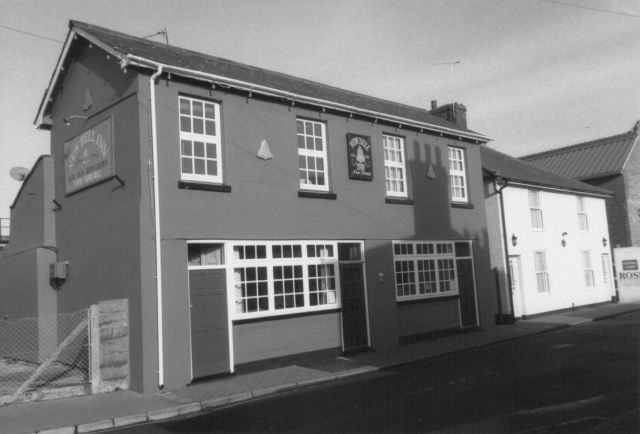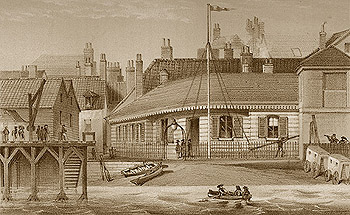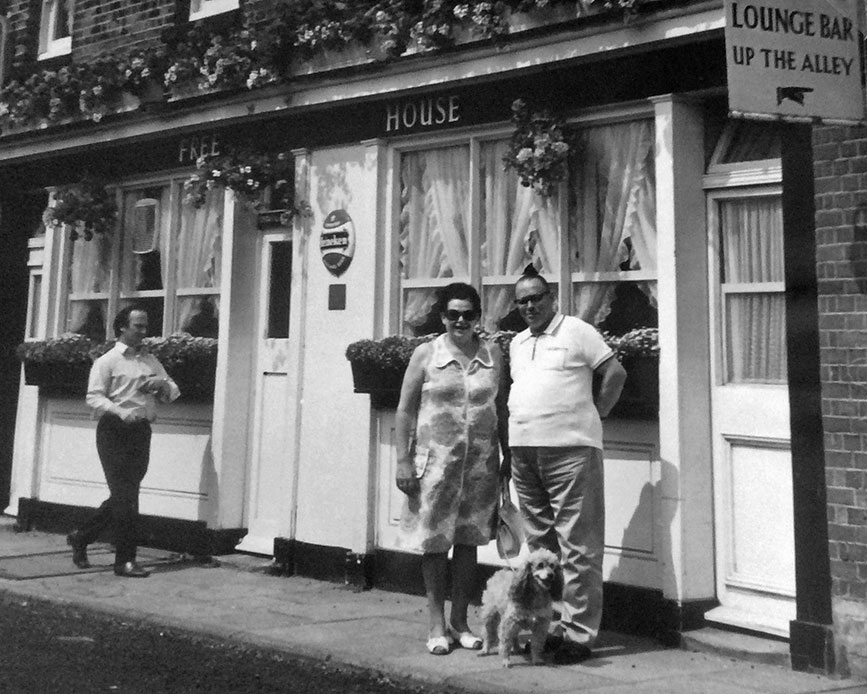The New Bell Inn
| Status: | Open as a pub |
| Phone: | 01255 503545 |
| Website: | www.thenewbell.co.uk |
There seems to have always been a pub known by the sign of the Bell or some variation in Harwich and although the connection between them is a little confusing the New Bell is the oldest pub still trading in Harwich today. It is a vibrant community local with a range of real ale and excellent lunchtime food.

History
It has proven difficult to unravel the history of the pubs known over the years as the Bell, Blue Bell and the New Bell. We know that there was originally both a Bell and a Blue Bell in Outpart Eastward at roughly the same time and, probably to avoid confusion, the pub we know today was given the "New" prefix by the Collector of Dues for the Corporation.
Although the word “bell” is quite common in Harwich pub names the simple “sign of the Bell” can be firmly fixed in time because a Corporation lease to one James Clements in 1743 clearly states “Ground and tenements lately built and now used as public house known as The ‘Bell’.”
A James Clements was Mayor of Harwich seven times between 1731 and 1755 as well as being the agent for the packet boats that ran between Harwich and the Continent so the Bell may have had an auspicious start in life in the stewardship of a very influential man.
The site and possibly part of the building was reputed to have been a blacksmith's shop back in the 17th Century so it is possible that the site was remodeled in the 1740s to form the buildings we see today. Structurally the pub is interesting as the back could have been built onto the front or vice versa. Certainly there are some beams that appear very old as does the central fireplace. Photographs also show that the front has changed quite a lot over the years and that the whole structure is probably a lot older than its modern form suggests.
It isn't clear whether James Clements actually ran the Bell in the mid 18th Century but by 1770 one Richard Randfield was the noted landlord. Richard was born in 1738 in Rotherhithe, Surrey (now in the London Borough of Southwark) before moving to Harwich. He ran the Bell until his death in 1786 when his widow Margaret, née Adams born in Harwich in 1745, took over. In fact Margaret appears as “Mrs. Randfield, Coal-Buyer and Victualler” noted as “Widow” running the Bell in the Universal British Directory of 1791. Margaret Randfield died in September 1811 and her son Robert took over as landlord.
In 1825 we find the first reference to the “New Bell Inn” in an advert for an auction in the Suffolk Chronicle. The auction is being run by John Squirrell who is Robert Randfield's brother-in-law with John's marriage being noted in the Suffolk Chronicle in 1817 as “Mr. Squirrell, coal-merchant, of Harwich to Miss Randfield, of the Bell Inn, in that town”.
When Robert Randfield dies in 1833 his will leaves the “New Bell Inn” to his niece Grace Beeston. Grace was the daughter of Robert's sister Grace and Thomas Beeston who were married in the old St. Nicholas Church at Harwich in 1761.


The New Bell is still leased from the Corporation but it is clearly a profitable business and Grace is left the leased premises and everything in it. It is described as being “situate near the Jetty” which probably refers to the jetty and slipway that then existed at the end of Outpart Eastward.
In 1841 Grace Beeston was still running the New Bell with an assistant, two servants and two lodgers and in 1851 has an assistant, a cook and a servant.
After twenty six years at the pub Grace Beeston retired in 1859 – ending a ninety year tenure by the Randfield family.
Simon Munson seems to take over the pub and is listed as landlord in 1862 and 1863. Munson was declared bankrupt in 1866 whilst landlord of the Three Cups Inn in Ipswich and is described as having previously been manager of the Cliff Hotel Dovercourt and before that innkeeper of the Bell Inn Harwich.
The next landlord we find reference to is Edward Paine who is succeeded by his son – another Edward Paine. John Osborne takes over briefly before William Pearce and his family move in around 1890.
William Pearce's tenure of the New Bell didn't get off to a good start because in 1890 he was charged before the Borough justices on Tuesday (7th October) with selling one and a half pints of gin adulterated with 60 per cent water. The case was proved by Inspector Fulcher and Police Constable Eaves, and the magistrates fined him £1 and costs of 14 shillings or 14 days hard labour. Jonathan Gooding, landlord of the Coach & Horses Inn, Harwich, who stood remanded, charged with a similar offence, was convicted and fined £1 and cost of 14 shillings, or 14 days hard labour. Both defendants produced cards, which had been exhibited in their bars, showing that all spirits sold by them were diluted with water. The Magistrates were advised by the Clerk (Mr. Christmas) that it was necessary that such information should be imparted to the customer by the parties selling the adulterated article.
In 1908 the New Bell had a turnover of 150-180 barrels (43,200 to 51,840 pints) of beer and 150 gallons of spirits (13,638 double measures) per annum.

In 1910 the pub was acquired by London brewers Mann, Crossman and Paulin making it the fourth Mann's pub in Harwich at the time.
In 1982 the pub was leased by Don and Pam Colcomb and they bought the freehold from the Council in 1988, staying on at the pub until 1996 when it was bought by Richard and Sue Watts. Richard and Sue retired in 2015 and new owners have continued to run the pub as a community local whilst putting their own stamp on it.
Notable Facts, Things to Look Out For
- The New Bell is not a listed building but most of the structure is clearly very old and parts may well date from the 17th Century.
